What we saw and learned at PCMA’s European conference

Share news
Listen
This year’s topic was “Disrupt + Deliver”. The first day was more strategic, more about questioning our priorities and playing fields while the second one was more about how to implement priorities, a bit more tactical. And all of it was experiential, mixing speakers with debates and working sessions. Here is a quick review of our experience.
Welcome party at the Hilton
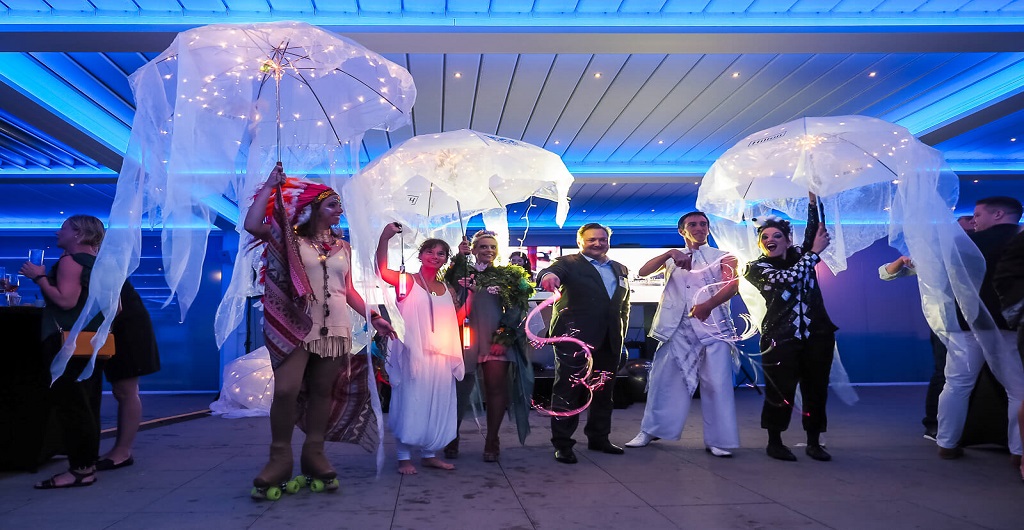
“The Hilton made us forget we were in a hotel, that was a full-blown special venue”, said one attendee about this welcome party. The welcome took place in the Hilton Diagonal’s Puro Beach club, next to the pool and involving elegant and artistic animations and happenings while delegates connected. But the most special happening was… the sudden pouring rain, in the middle of the event, for which fortunately a perfect indoor plan B was ready.
Opening session: disrupt or be disrupted!
After welcome speeches by PCMA and the local partners, international speaker Rik Vera opened the educational programme with a thought-provoking session. He reminded us we face three challenges: a tech revolution, a global revolution, and an environment revolution, which are impacting everything we do. The good news for our industry? “What you do is design experience to connect people to change society and we don’t do that by computers, but by designing human experiences”. His formula: “Connect to many, engage individuals”. This is a challenge in all businesses but even more so in events: you have to reach many people, but make everyone feel unique.
Rik also shook us up about the need to embrace change. As Jack Welch said, “if the pace of change outside your organization is faster than inside, the end is near”. Don’t wait to be kodaked, don’t wait for the tsunami on the beach, get ready in an ever changing world. So he suggests a new KPI, the ‘net curiosity score’, essential when we know the survivors will be the most adaptable ones, the most curious ones. Another change he stressed is the need to value data: “you don’t have to change your business model, but rather to use your business to gather data. Check not only what you sold, but what data you gathered”. Finally, empower the public: don’t design the experiences, let your customer draw their own journey. The future is about segments of one.
Registering great ideas
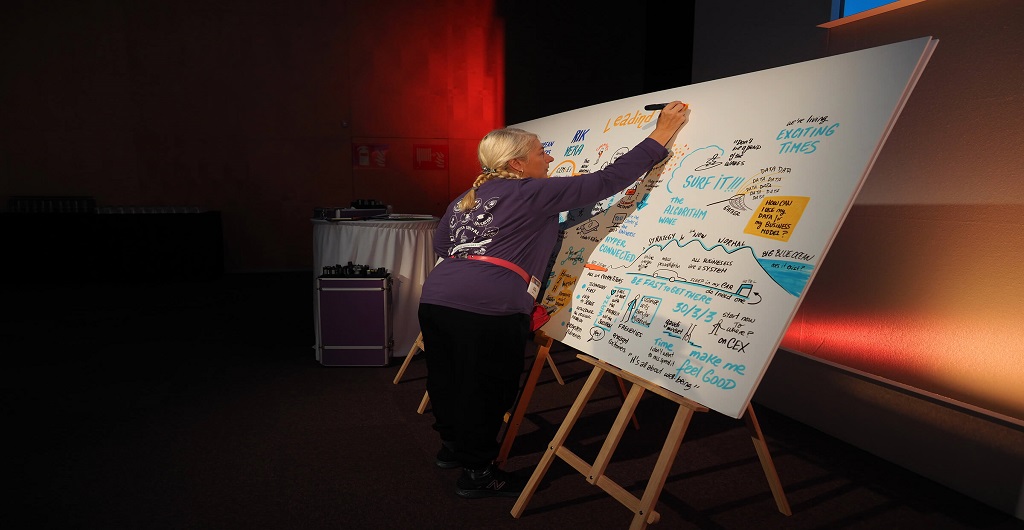
A graphic recorder was present in the main sessions, to capture in a highly visual way the key ideas that were expressed, as the photography shows.
Morning workshops
After the plenary, delegates split in various groups for more hands-on sessions. We attended the workshop “Free Your Content to Focus on Game-Changing Experiences” by Felix Rundel and Sami Benchekroun in which the authors got attendees to reflect on the four main elements of their events (content, attendee involvement, show and social elements) and how to balance them. They also insisted on the importance of the experience journey map: define moments of surprise, of comfort, of expectations, of wow… and focus on how each interaction of the participants with the event can be improved, from the very welcome. They explained the need to create not just nice or meaningful but transformative experiences, in which you get something you will bring home and which will impact and change you. Ideally purpose-driven, a conference design which starts with the question “why?”. They illustrated these points with the event Falling Walls, a gathering of innovative thinkers in Berlin reflecting about how to change the world, which combines a whole set of innovative experiences, such as getting delegates to experience sound torture or including in all delegates kits a piece of plastic taken from a polluted island, so they take home a bit of the problem we have to solve.
Second plenary session: emotional intelligence to design experiences.
Kim Myhre (MCI Experience) and Meredith Rollins (PCMA) explained how traditional meetings and events metrics (attendees, leads) should be completed with an “emotional intelligence ROI”, measuring what people really gathered from the event, what they felt and how they were changed. As Mastercard’s CMO was saying, “the importance of experiences in the marketing mix is growing”. There is so much saturation, that we have become very suspicious and self-protective of companies trying to sell us stuff. But experience cuts the marketing clutter, if you shift the focus from delegate management to personalized experience. You have to move to human-centered experience design, which is very complex. You will use tomorrow data management to create experiences based on insights and not on logistics. Your thought cycle will be “have empathy – define – ideate – prototype – test – improve”, like in design thinking. And finally, you have to map the whole experience, from before to after, in details.
Lunch took place in the beautiful banquet hall of the CCIB, with great gastronomy and a stunning view to the sea, while visual thinking posters of the morning sessions were displayed around the venue. The place also featured the Idea Lounge by Visit Britain.
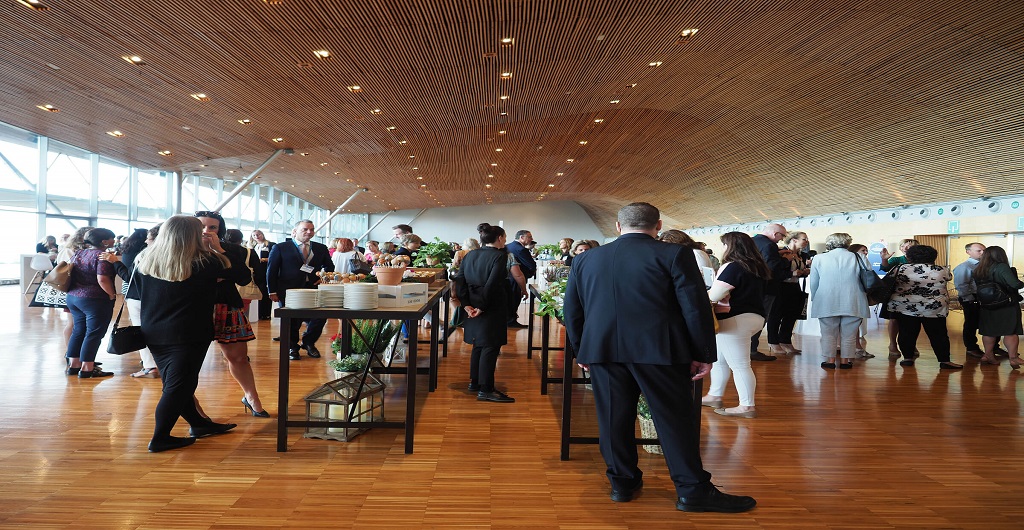
Sweat to collect!
The event also included a fundraising activity. We see here PCMA Foundation Trustee Mary Pat Heftman and Chair Carol McGury face off. More than 2000 Euros were raised by PCMA supporters for this battle of wills.
Afternoon: Off-site educational sessions
A trend in events is to enjoy the city, not just its conference center… so in the afternoon, we were split into several groups, for sessions in different venues: at FC Barcelona’s Camp Nou, a session dealt with community engagement, and at the Hospital de Sant Pau, one of the most architecturally impressive landmarks in Barcelona, the group explored reinvention. We went to Valkiria where we explored how data could play a more active role in events. Domestic Data Streamers explained how data gathering can turn into a fun experience, and showed cases of brand activations in festivals: in one, the public had to walk through one of two doors depending on their tastes of music or lifestyle, or high-five a guy walking around the festival with one answer corresponding to each hand. All this gathered data about the public tastes, while the public had fun.
He also reminded us of the power of crowds (this session has a public totalling 2,000 years of experience in event management – what a goldmine!) and urged us to tap into this amazing resource. Involving people is also a powerful way of motivating them: “the sense of belonging is very important when people feel something is theirs, that they have created it. So what can you personalize in your event, to everyone’s taste and purpose and integrating their ideas?
Then Bonny Shapira from Cisco explained how they implemented this idea of data gathering and data representation during Cisco Live, getting the community to participate in challenges (posting on social media, learning and bringing knowledge…), each of which would help build the “bridge to possible” that is the center of their latest marketing campaign. All delegates could feel and see how the community was building knowledge during Cisco Live. Finally, a word of wisdom from Bonny: “The brand is the experience that is created every time we interact with the customer”.
Then we got to work, defining by groups of 10 what types of data we could look to gather from a fictitious event, and how we could gather data in an experiential, innovative way. A great team activity to rethink this essential aspect of event value.
Dinner with a very local show
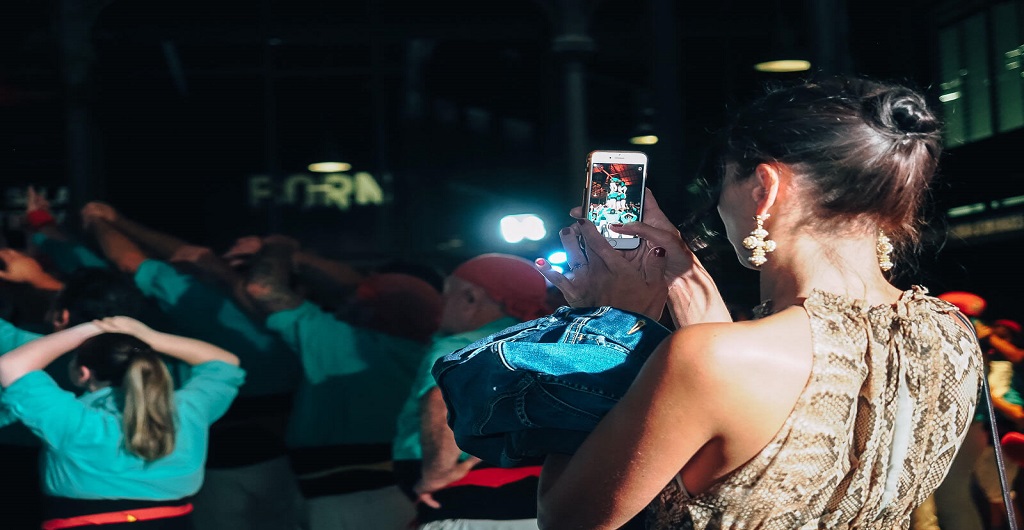
The dinner took place at the Mercat del Born, an historic venue in which restored Roman ruins are visible, and featured a local impressive show: the human towers… which got quite a few jaws to drop and quite a few smartphones to photograph and post.
But exploring the city went beyond some venues: the event took place during the city celebration, the Mercè, so participants also explored Barcelona during the city’s festival, featuring open-air concerts, dancing, authentic food, street art and a fireworks display.
Day 2: the opening plenary
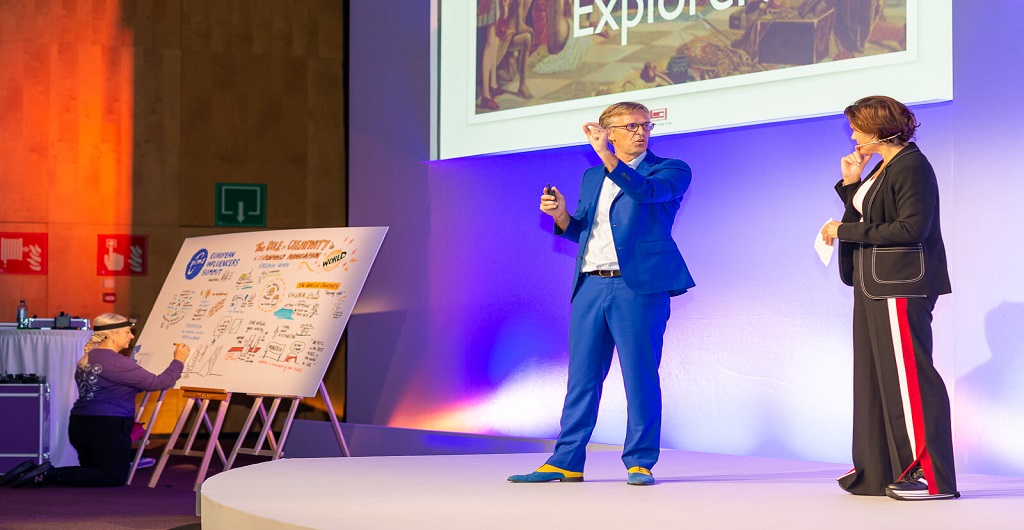
A quick coffee, and an idea-packed session! International creativity speaker Fredrik Härén stressed “the role of creativity in a rapidly developing world”, and explained how creativity is about connecting different things not usually combined. He also gave the formula to maximise this: “Number of ideas = number of people * (knowledge + innovation)”. In a way, copying is part of creativity: it is about getting inspired and using the right components, combining and creating something new based on that. And we have to open our minds: note that disrupted industries such as cars and banks are good at seeing what is created in their industry, but not from other ones and therefore disruption comes from outside. Now… who from outside your industry should you check out? He also urged us to understand that events are about being the explorer, thinking about what we can explore and innovate. A great eye-opening session.
“Ideathon”
Now that was fun (and useful)! MCI’s Oscar Cerezales conceived this hands-on session breaking some traditional rules of conferences: no speaker, a long session (2.5 hours), and lots of time to reflect on your own about your own issues. Something like the opposite of TED. This “ideathon” got people by groups of 15-20 people, grouped according to a pre-event survey, and gave them a 5-step framework to analyse their own business challenges and find solutions. I was lucky enough to moderate one, which combined a lot of work of quiet self diagnosis and analysis of what each one could improve in their business model, with moments of sharing ideas. An unusual session, and a fantastic way to complete the speaker sessions with an opportunity to work on your own challenges and integrate all the new ideas heard during the conference. Delegates could go home with their framework partly filled of ideas to work on.
Closing session: David Meade teaches and entertains
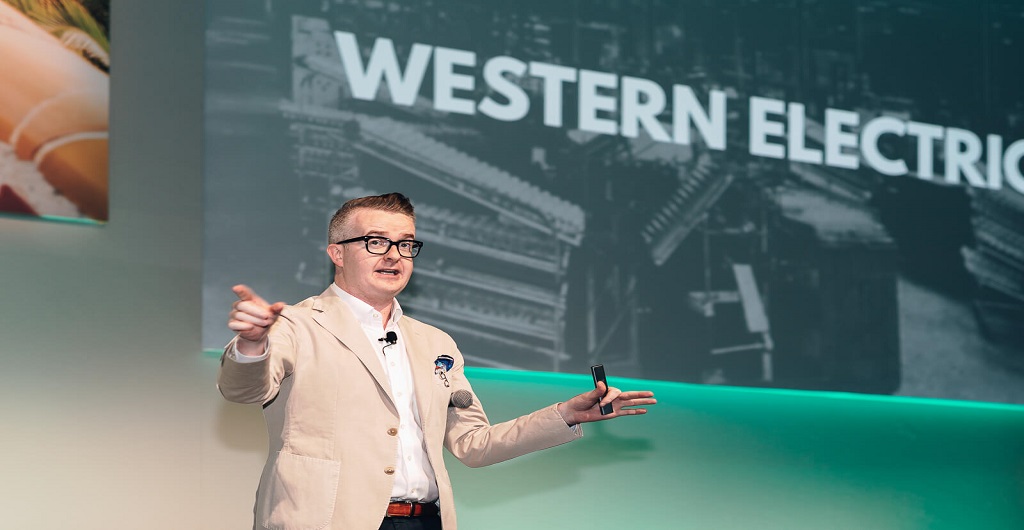
This BBC-bred speaker was so engaging and entertaining that one could almost forget how serious the content was. He explained with many case studies the importance of engaging with employees and how simple engagement moves can bring up productivity. He also explained several mind rules to take into account when trying to convince someone: for instance, we tend to gravitate towards the latest option we have seen; we can’t hold more than 3 options in our head at the same time (keep your scenarios simple); we tend to prefer several options, even if some are clearly better than others; we react more to the prospect of loss than to the possibility of gain (so stress what people may lose, when convincing them!); and finally the importance of knowing something is possible. This was shown when the 4 minute mile, supposedly impossible to break, was broken for the first time: many other athletes broke it in the following months, as they now saw it as possible. A great engaging session with a very scientific basis.
Closing: change the world!
PCMA is an association, a community of professionals but also of people interested to improve the world. Besides thanking everyone and stressing what great experience this has been, PCMA’s CEO Sherrif Karamat urged all participants to decide to change something today, improve someone’s life, or help in a cause. Changing the world starts today!
Thank you for the photos: Marta Fernández and PCMA.











